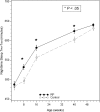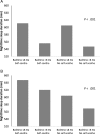INSIGHT Responsive Parenting Intervention and Infant Sleep
- PMID: 27354460
- PMCID: PMC4925087
- DOI: 10.1542/peds.2016-0762
INSIGHT Responsive Parenting Intervention and Infant Sleep
Abstract
Objectives: Inadequate sleep during infancy is associated with adverse outcomes for infants and families. We sought to improve sleep behaviors and duration through a responsive parenting (RP) intervention designed for obesity prevention.
Methods: The Intervention Nurses Start Infants Growing on Healthy Trajectories (INSIGHT) study is a randomized trial comparing a RP intervention with a safety control. Primiparous mother-newborn dyads were randomized after childbirth, and research nurses delivered intervention content at home visits at infant ages 3, 16, 28, and 40 weeks and at a research center visit at 1 year. The RP sleep component included developmentally appropriate messages about bedtime routines, sleep location and behaviors, and responses to wakings. Portions of the Brief Infant Sleep Questionnaire were administered 2, 8, and 52 weeks after birth with expanded sleep-related data collection at 16 and 40 weeks.
Results: Two hundred and seventy-nine dyads completed the first home visit; 90.7% completed the 1-year visit. Compared with controls, RP group infants were less likely to have prolonged bedtime routines >45 minutes and more likely to have earlier bedtimes at 16 and 40 weeks. They were less likely to be fed immediately before bed and more likely to self-soothe to sleep. At 8, 16, and 40 weeks, RP group nocturnal sleep duration was longer by 35, 25, and 22 minutes, respectively (P < .05 for all). Sleep duration at 1 year was similar between groups.
Conclusions: The INSIGHT RP intervention positively influenced developmentally appropriate bedtime routines, sleep-related behaviors, and sleep duration for infants.
Trial registration: ClinicalTrials.gov NCT01167270.
Copyright © 2016 by the American Academy of Pediatrics.
Conflict of interest statement
Figures



References
-
- National Sleep Foundation “Sleep in America” Poll. Washington, DC: National Sleep Foundation; 2004
-
- Matricciani LA, Olds TS, Blunden S, Rigney G, Williams MT. Never enough sleep: a brief history of sleep recommendations for children. Pediatrics. 2012;129(3):548–556 - PubMed
-
- Sivertsen B, Harvey AG, Reichborn-Kjennerud T, Torgersen L, Ystrom E, Hysing M. Later emotional and behavioral problems associated with sleep problems in toddlers: a longitudinal study. JAMA Pediatr. 2015;169(6):575–582 - PubMed
-
- Ross CN, Karraker KH. Effects of fatigue on infant emotional reactivity and regulation. Infant Ment Health J. 1999;20(4):410–428
-
- Spruyt K, Aitken RJ, So K, Charlton M, Adamson TM, Horne RS. Relationship between sleep/wake patterns, temperament and overall development in term infants over the first year of life. Early Hum Dev. 2008;84(5):289–296 - PubMed
Publication types
MeSH terms
Associated data
Grants and funding
LinkOut - more resources
Full Text Sources
Other Literature Sources
Medical

